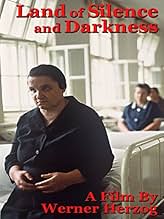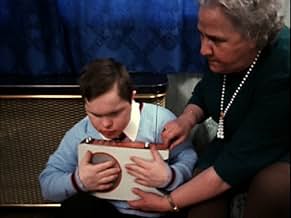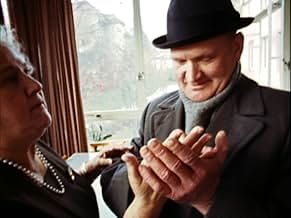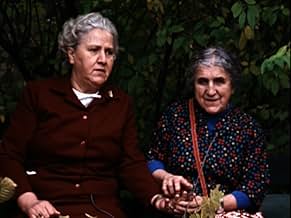Le pays du silence et de l'obscurité
- 1971
- Tous publics
- 1h 25min
Ajouter une intrigue dans votre langueThrough examining Fini Straubinger, an old woman who has been deaf and blind since adolescence, and her work on behalf of other deaf and blind people, this film shows how the deaf and blind ... Tout lireThrough examining Fini Straubinger, an old woman who has been deaf and blind since adolescence, and her work on behalf of other deaf and blind people, this film shows how the deaf and blind struggle to understand and accept a world from which they are almost wholly isolated.Through examining Fini Straubinger, an old woman who has been deaf and blind since adolescence, and her work on behalf of other deaf and blind people, this film shows how the deaf and blind struggle to understand and accept a world from which they are almost wholly isolated.
- Récompenses
- 1 victoire et 1 nomination au total
Avis à la une
Americans who see this film will be reminded of Helen Keller. But Keller lost her sight and hearing (to scarlet fever) in very early childhood, and retained only very slight memory of her stolen senses. (Touchingly, Keller did recall seeing the rainbows formed by sunlight refracted through the crystal prisms of her mother's chandelier.) Because Straubinger retained a full memory and understanding of vision and sound, she became useful as an ambassador to the kingdoms of the blind and deaf. Fini Straubinger has dedicated her life to working with people who are deaf and blind, most of whom have borne those double handicaps either from birth or (like Keller) from infancy.
Herzog follows Straubinger on a trip through Germany, financed by an organisation for the deaf-blind. We see her communicating with other deaf-blind people through a sort of tapping code. Activities which the rest of us take for granted are truly alien experiences for these unfortunate souls. For instance, the simple act of taking a shower: for someone who has never experienced this before, and cannot have it adequately explained, the sudden onslaught of pressurised water is deeply terrifying. In the final sequence, we see a deaf-blind man hugging a tree: attempting to experience this alien life-form through his senses of touch, taste and smell.
One sequence, showing Straubinger interacting with a chimpanzee, I found unpleasant and unnecessary. I get the impression that this scene was staged by Herzog in an ill-thought attempt to inject some light 'comedy relief' into a subject that audiences might find deeply depressing.
I made a point of identifying this film as a documentary, meaning it's non-fiction. Indeed, Fini Straubinger is a real person: her blindness, her deafness, and (more importantly) her work with the deaf-blind are all real, all true. At one point in this film, Straubinger tells us that her most vivid sensory memory -- before the darkness and silence closed in -- is an image of the rapturous faces of ski jumpers as they leap into the sky. After this film was released, Herzog admitted in an interview that Straubinger had never seen a ski jumper: Herzog wrote those lines for her, because he felt that ski jumpers provided the visual symbol (I refuse to misuse the word 'metaphor') which would simultaneously represent sensory rapture and Straubinger's own isolation.
I reluctantly concede that this sort of fictionalisation is a valid device in documentary films. Those of us who are fortunate to see and hear cannot truly experience the dark silent world of Fini Straubinger and her colleagues. (Unless we too are conscripted into that realm, by accidents or illness.) Since this film can never truly put us into the mind of a deaf-blind person -- especially one who has been both deaf and blind since birth, like most of the people encountered here -- some degree of invention is necessary. I recall an anecdote told by Albert Einstein (too long to repeat here; send me an email if you want the details) concerning his attempt to explain milk to a blind man: this incident never actually occurred, but Einstein told the story to prove a point about his theory of relativity.
'Land of Silence and the Darkness' is a fascinating film about a fascinating human being. My rating: 8 out of 10.
It's a documentary that explores the world of deafblind people living in Germany, controlled by a campaigning woman, Fini Straubinger, who makes it her business to travel the country and help those in need. What transpires is a travelogue fraught with unforgettable moments; moments that I don't mind admitting had me in tears on more than one occasion. The sequence with a 22 year old man who's never had any education or even contact with the outside world - he can't even walk - is the film's moving highlight.
Herzog lets his story speak for himself, although he makes some strong choices as director. Visits to a cactus house and a zoo are utterly engrossing and the addition of some classic music to the soundtrack really helps to tug at the heartstrings. Not an easy film to watch then, but one which is nevertheless thoroughly compelling.
Le saviez-vous
- ConnexionsFeatured in Je suis ce que sont mes films (1978)
Meilleurs choix
- How long is Land of Silence and Darkness?Alimenté par Alexa
Détails
- Date de sortie
- Pays d’origine
- Langue
- Aussi connu sous le nom de
- Land of Silence and Darkness
- Lieux de tournage
- Sociétés de production
- Voir plus de crédits d'entreprise sur IMDbPro
- Durée1 heure 25 minutes
- Mixage
- Rapport de forme
- 1.37 : 1
Contribuer à cette page

























